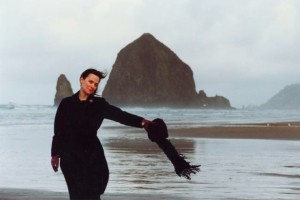
By Alla Renée Bozarth
Miracles happen—
the French took charge and cast out the Nazis
from the City of Lights, when the Occupying Germans feared
the approach of the Allies and tried to force a 9pm curfew
on the citizens of Paris.
Occupation, if it is benign, is one thing, but a curfew is an outrage.
The police took over a building opposite the Cathedral of Notre Dame
and then the women and children came out and started hurling their rocks
and the men shot tanks with small guns, and de Gaulle begged Eisenhower
to bring in the Allies, which he had formerly refused to do.
Impressed with the suddenly aggressive valor of the French,
the General agreed to follow a band of French troops into Paris,
and when they arrived, a Victory Parade was already underway
as the Liberation of Paris had officially happened the day before.
A distant humming reached the ears of the Americans,
a strange sound rising to a low murmur as they came nearer,
then erupting into an overwhelming roar of jubilation.
The people of Paris rushed on foot to greet them, women kissed them,
some offered wine to the soldiers, they climbed up onto the tanks,
hailing the Liberation of the City of Lights in the summer of 1944.
On the same day, August 26, twenty-four years before,
the Women’s Suffrage Amendment was written into the Constitution
of the United States, a victory for humanity created by the relentless
courage, effort and suffering of American women for generations.
By virtue of those heroic Suffragists, on June 4, 1919,
the Nineteenth Amendment had been passed by both
the House and Senate of Congress,
but it needed to be ratified by state legislatures.
Over a year later, on August 18th the deciding state
was Tennessee, the 36th state to cast its vote in favor,
and the deciding vote was cast by Harry Burn,
at twenty-four the youngest state legislator.
That morning he’d opened his mail and read a letter
from his mother, in which she said she’d been watching
to see him declare his inclination toward Suffrage for Women,
but so far she saw nothing. She ended her message,
“Don’t forget to be a good boy . . . and vote for suffrage.â€
Supporters of suffrage wore yellow roses and filled the balcony
while opponents wore red roses on the main floor.
Harry Burn walked in wearing red, but when he voted,
he said “Aye.â€
All the women in the balcony threw down
their flowers, and on that day,
there was a beautiful storm of yellow roses
raining all over the representatives
of the state of Tennessee.
Â
From Purgatory Papers, copyright 2014.
All rights reserved.
In Alla’s one words ,” I’m one of the Philadelphia Eleven who became the first women priests in the Episcopal Church in 1974. In 1975 I founded Wisdom House, an interfaith spirituality and healing center with inclusive language liturgies, soul mending and soul tending, and mentoring for art or ministry. I’m a feminist theologian, certified Gestalt therapist and a poet who enjoys collaborations with other artists. Because of health needs I’m now retired from active ministry and focus on writing. I’ve written 40 books, half of them published and most of the new ones poetry collections.You’ll find contact information and links to all my blogs by clicking on my picture or name above. If you’re now on a single theme blog, once you’ve done that, you can navigate to my main blog, “Alla Bozarth Words and Images Welcoming Light in the Wilderness” on the list. There you’ll be able to browse among many posts. Check the Archives for seasonal posts. ~See selected poems: http://www.poemhunter.com/alla-renee-bozarth/poems/ ~Thanks, Love, Light and Blessings to You!”


